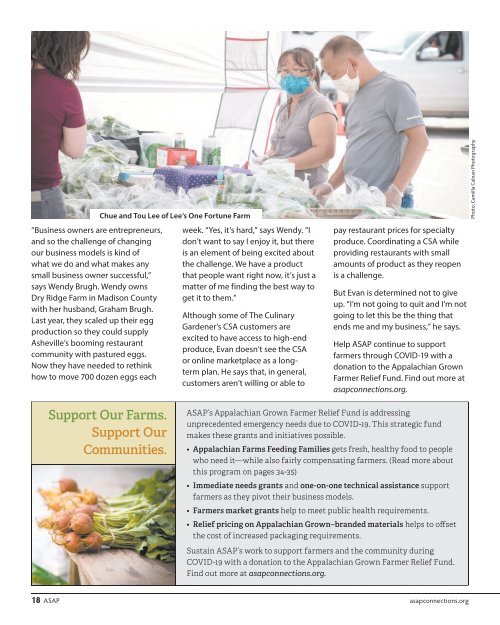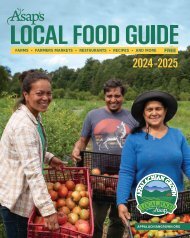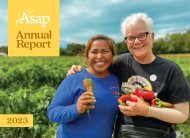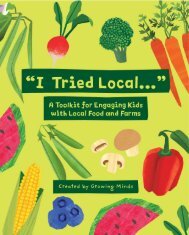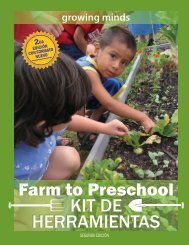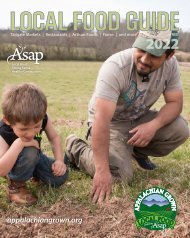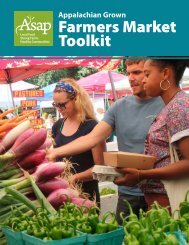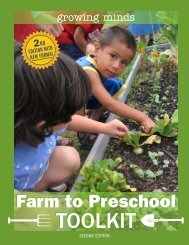2020 Local Food Guide
ASAP’s annual Local Food Guide is the definitive resource for finding local food in the Southern Appalachians. In 2020 we printed an abridged COVID edition featuring stories from farmers and details about farmers markets and farm activities this season. Find more information on farms, markets, restaurants, groceries, artisan foods, lodging, and more at appalachiangrown.org.
ASAP’s annual Local Food Guide is the definitive resource for finding local food in the Southern Appalachians. In 2020 we printed an abridged COVID edition featuring stories from farmers and details about farmers markets and farm activities this season. Find more information on farms, markets, restaurants, groceries, artisan foods, lodging, and more at appalachiangrown.org.
You also want an ePaper? Increase the reach of your titles
YUMPU automatically turns print PDFs into web optimized ePapers that Google loves.
“Business owners are entrepreneurs,<br />
and so the challenge of changing<br />
our business models is kind of<br />
what we do and what makes any<br />
small business owner successful,”<br />
says Wendy Brugh. Wendy owns<br />
Dry Ridge Farm in Madison County<br />
with her husband, Graham Brugh.<br />
Last year, they scaled up their egg<br />
production so they could supply<br />
Asheville’s booming restaurant<br />
community with pastured eggs.<br />
Now they have needed to rethink<br />
how to move 700 dozen eggs each<br />
Chue and Tou Lee of Lee’s One Fortune Farm<br />
week. “Yes, it’s hard,” says Wendy. “I<br />
don’t want to say I enjoy it, but there<br />
is an element of being excited about<br />
the challenge. We have a product<br />
that people want right now, it’s just a<br />
matter of me finding the best way to<br />
get it to them.”<br />
Although some of The Culinary<br />
Gardener’s CSA customers are<br />
excited to have access to high-end<br />
produce, Evan doesn’t see the CSA<br />
or online marketplace as a longterm<br />
plan. He says that, in general,<br />
customers aren’t willing or able to<br />
pay restaurant prices for specialty<br />
produce. Coordinating a CSA while<br />
providing restaurants with small<br />
amounts of product as they reopen<br />
is a challenge.<br />
But Evan is determined not to give<br />
up. “I’m not going to quit and I’m not<br />
going to let this be the thing that<br />
ends me and my business,” he says.<br />
Help ASAP continue to support<br />
farmers through COVID-19 with a<br />
donation to the Appalachian Grown<br />
Farmer Relief Fund. Find out more at<br />
asapconnections.org.<br />
Photo: Camilla Calnan Photography<br />
Support Our Farms.<br />
Support Our<br />
Communities.<br />
ASAP’s Appalachian Grown Farmer Relief Fund is addressing<br />
unprecedented emergency needs due to COVID-19. This strategic fund<br />
makes these grants and initiatives possible.<br />
• Appalachian Farms Feeding Families gets fresh, healthy food to people<br />
who need it—while also fairly compensating farmers. (Read more about<br />
this program on pages 34-35)<br />
• Immediate needs grants and one-on-one technical assistance support<br />
farmers as they pivot their business models.<br />
• Farmers market grants help to meet public health requirements.<br />
• Relief pricing on Appalachian Grown–branded materials helps to offset<br />
the cost of increased packaging requirements.<br />
Sustain ASAP’s work to support farmers and the community during<br />
COVID-19 with a donation to the Appalachian Grown Farmer Relief Fund.<br />
Find out more at asapconnections.org.<br />
18 ASAP asapconnections.org


